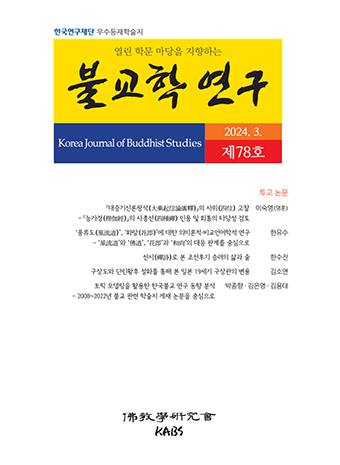Abstract
References
Sorry, not available.
Click the PDF button.
Information
The purpose of this study is to examine the yogācāra thoughts of Zong-jing-lu (宗鏡錄) by Yong-ming Yan-shou (永明延壽: 904-974) who lived in Wu-dai (五代) period in China. Yogācāra thoughts occupies an important part in Zong-jing lu.Yan-shou's perspective on yogācāra thoughts is different from Fa-xiang-zong (法相宗) in Tang (唐) dynasty. First of all, he divides yogācāra thoughts into two, perfect (具分) and non-perfect (不具分). Perfect yogācāra thought is based upon Ālayavijñāna (阿賴耶識) in which 'neither birth nor death (不生滅)' diffuses harmoniously with 'birth and death(生滅)', and yet in which both are neither identical nor different. This opinion on Ālayavijñāna is same with that of The Awakening of Faith (大乘起信論). Non-perfect yogācāra thought is based upon Ālayavijñāna, lying only in the state of 'birth and death'. This opinion on Ālayavijñāna is that of Fa-xiang zong. Yan-shou regards this thoughts as non-perfect, because it only has a aspect of phenomena (事, 生滅), but don't have a aspect of the Absolute (理, 不生滅). Furthermore he thinks that perfect yogācāra thoughts is close to original thoughts of Vasubandhu (世親). He bases upon the thoughts of Mahāyāna sūtra like Laṅkāvatārasūtra (楞伽經), etc. and justifies his opinion. According to his explanation, Tathāgata-garbha (如來藏) is clean itself when it doesn't combine with avidyā (無明), but it changes into Ālayavijñāna when it combines with avidyā. And he criticizes that the Cheng-wei-shi-lun's (成唯識論) commentary on 25'th verse of Triṃśikā-vijñapti-mātratā-siddhi (唯識三十頌) is not perfect, through the new interpretation of this verse. Yan-shou thinks that the key concept of Zong-jing-lu is One Mind (一心) which has two aspects, changelessness (不變) and participation in change (隨緣). He thinks that Fa-xiang-zong deals with the one aspect of One Mind which participates in change, but Fa-xing-zong (法性宗) deals with the two aspects of One Mind. He reaches a conclusion that Fa-xing-zong can include Fa-xiang-zong, and that the One Mind theory is the perfect realization of yogācāra thoughts which originates from Vasubandhu.
Click the PDF button.
- Publisher :Korean Association of Buddhist Studies
- Publisher(Ko) :불교학연구회
- Journal Title :Korea Journal of Buddhist Studies
- Journal Title(Ko) :불교학연구
- Volume : 14
- No :0
- Pages :159~182


 Korea Journal of Buddhist Studies
Korea Journal of Buddhist Studies






